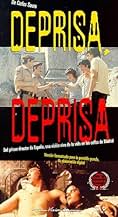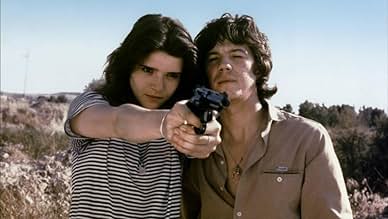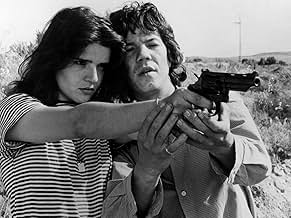Ajouter une intrigue dans votre langueAngela begins to hang around with Pablo and his gang of young robbers.Angela begins to hang around with Pablo and his gang of young robbers.Angela begins to hang around with Pablo and his gang of young robbers.
- Réalisation
- Scénario
- Casting principal
- Récompenses
- 1 victoire et 1 nomination au total
Berta Socuéllamos
- Ángela
- (as Berta Socuellamos)
Jose Antonio Valdelomar González
- Pablo
- (as Jose Antonio Valdelomar)
Jesús Arias
- Meca
- (as Jesus Arias)
José María Hervás Roldán
- Sebas
- (as Jose Mª Hervas)
María del Mar Serrano
- María
- (as Maria del Mar Serrano)
André Falcon
- Cajero
- (as Andre Falcon)
Yves Barsacq
- Luis
- (as Ives Barsacq)
Joaquín Escola
- Doctor
- (as Joaquin Escola)
Matías Prats
- Locutor
- (as Matias Prats)
Avis à la une
A good directed film, based on juvenile delinquency, with a marvelous photography.Not the best of this genre but its well done and has a great sound track that explains this world so purely, with the masters of rumba (Los Chunguitos).The director, influenced by other films like `Perros Callejeros` used real kids from the streets to give the film a more realistic touch.The main actor (Jose Antonio Valdelmoro) Pablo in the film,died two years later the same way as told in the film.
Pablo and Angela are in love,but also they are poor and together with their friends El Meca and Sebas they are forced to live a life of crime to survive and escape the suburbs of Madrid.The four of them steal cars and plan armed robbery`s to earn money,and also as part of the street life they do drugs.These kids are known as good people among there neighbourhood,but can also be violent and very dangerous.Will they live to see their dreams come true and make it out of this world?Watch this movie and find out!Very entertaining.
Pablo and Angela are in love,but also they are poor and together with their friends El Meca and Sebas they are forced to live a life of crime to survive and escape the suburbs of Madrid.The four of them steal cars and plan armed robbery`s to earn money,and also as part of the street life they do drugs.These kids are known as good people among there neighbourhood,but can also be violent and very dangerous.Will they live to see their dreams come true and make it out of this world?Watch this movie and find out!Very entertaining.
This film made such a deep impression upon me that I was sure to view it a second time before it disappeared from tcm "on demand" for an indefinite period of time. Who knows for how long? I may even watch it a third time before its one week run expires at midnight tonight.
In some ways, this film reminds me of notable American films depicting crime sprees, such as "Badlands" or "Gun Crazy", but it is uniquely Spanish in nature and truly stands on its own as a distinctive work of art. Carlos Saura, a director with whom I was totally unfamiliar before a recent tcm double feature of two of his films, is to be commended for an outstanding film that captures a very special atmosphere and tone.
I travelled in Spain, including Madrid, for a month at the end of 1971 when Francisco Franco still ruled the country with a strong arm, including an intricate network of secret police that was not unlike totalitarian regimes everywhere else throughout history. It is very significant that this film was produced after the death of Franco because the Spain that is depicted in this movie seems like a very different country than the Spain that I visited in 1971. While the police in the film are tough enough, they were most likely a much more formidable force during Franco's iron rule.
The use by Saura of the speeding trains outside the balcony of the flat used by the gang as its headquarters is brilliant as they symbolize a society that doesn't even pause for a moment to consider the existence of this totally alienated group until it draws attention to itself by breaking the law, sometimes in extremely violent ways. I could have been riding on one of those trains as a foreign tourist, totally unaware of the existence of this element as it was kicked to the curb of Spanish civilization. Note the shocked, disgusted reaction of the two older, established women when they are suddenly confronted by the disrespect displayed by the delinquent group at the holy site.
The strong flamenco influence of the gypsy rumba music played in the background throughout the film also creates a uniquely delicious Spanish flavor to the film. The musical score powerfully contributes to the overall impact, which is no less than magical and hypnotic for me. The use of amateur actors is another stroke of genius by the director as it makes the action all the more real and believable, not unlike the post World War II Italian films of Vittorio De Sica which I also love.
Did anyone expect the "respectable" doctor to return, as he had promised, after he took Angela's money? And what was to become of Angela after she walked into the darkness at the end? I very much wanted to know. From the very start, the genius of Carlos Saura sustained my interest and involvement to the bitter end. This is a great and much under-rated movie!
In some ways, this film reminds me of notable American films depicting crime sprees, such as "Badlands" or "Gun Crazy", but it is uniquely Spanish in nature and truly stands on its own as a distinctive work of art. Carlos Saura, a director with whom I was totally unfamiliar before a recent tcm double feature of two of his films, is to be commended for an outstanding film that captures a very special atmosphere and tone.
I travelled in Spain, including Madrid, for a month at the end of 1971 when Francisco Franco still ruled the country with a strong arm, including an intricate network of secret police that was not unlike totalitarian regimes everywhere else throughout history. It is very significant that this film was produced after the death of Franco because the Spain that is depicted in this movie seems like a very different country than the Spain that I visited in 1971. While the police in the film are tough enough, they were most likely a much more formidable force during Franco's iron rule.
The use by Saura of the speeding trains outside the balcony of the flat used by the gang as its headquarters is brilliant as they symbolize a society that doesn't even pause for a moment to consider the existence of this totally alienated group until it draws attention to itself by breaking the law, sometimes in extremely violent ways. I could have been riding on one of those trains as a foreign tourist, totally unaware of the existence of this element as it was kicked to the curb of Spanish civilization. Note the shocked, disgusted reaction of the two older, established women when they are suddenly confronted by the disrespect displayed by the delinquent group at the holy site.
The strong flamenco influence of the gypsy rumba music played in the background throughout the film also creates a uniquely delicious Spanish flavor to the film. The musical score powerfully contributes to the overall impact, which is no less than magical and hypnotic for me. The use of amateur actors is another stroke of genius by the director as it makes the action all the more real and believable, not unlike the post World War II Italian films of Vittorio De Sica which I also love.
Did anyone expect the "respectable" doctor to return, as he had promised, after he took Angela's money? And what was to become of Angela after she walked into the darkness at the end? I very much wanted to know. From the very start, the genius of Carlos Saura sustained my interest and involvement to the bitter end. This is a great and much under-rated movie!
A good look at the delinquency in Spain of the 80's, good photography, great soundtrack.
Pablo, Angela, El Meca and Sebas, four marginalized teenagers from Madrid are forced to live a life of crime in order to survive and escape the poverty they live in. The movie is quite entertaining, the crime scenes are very realistic, the soundtrack fits just perfect and the message is clear and powerful.
Crime is created by poverty and poverty is created by luxury, something we are all responsible of.
A great political statement, then and now.
Pablo, Angela, El Meca and Sebas, four marginalized teenagers from Madrid are forced to live a life of crime in order to survive and escape the poverty they live in. The movie is quite entertaining, the crime scenes are very realistic, the soundtrack fits just perfect and the message is clear and powerful.
Crime is created by poverty and poverty is created by luxury, something we are all responsible of.
A great political statement, then and now.
A group of friends embark on a short and doomed life of crime in Madrid in the 1970's. Filmed in color in and around Madrid, with some great locations and a nice flamenco/rock soundtrack, the characters choose to live dangerously rather than work in deadend jobs. The film seems to be saying something about society and opportunity, but doesn't get lost in any sermons. It sticks with the characters up to the inevitable end, and goes into some out of the way locations, with one scene having them on horseback and crossing a busy highway. Saura has made a real portrait out of each of the characters while showing a dusty and not too pleasant side of Madrid somewhere out in its suburbs.
Jose Antonio Valdelomar Gonzales asks Berta Socuellamos to be his girlfriend. She agrees. She integrates quickly into his gang of bank robbers. For a while, things go very nicely. They make large scores, leave no important clues, and she is saving money to buy an apartment for them. Then a job goes wrong.
The most notable thing about this movie by Carlos Saura is that the six top roles -- the men in the gang, Srta Socuellamos, and another member's girl friend -- were found in casting calls for non-professional actors. Only one of them appeared on the screen again. Gonzales died 11 years later of a drug overdose in prison, where he was arrested for bank robbery. Rumors abound about the production, most of them scurrilous. I won't take Saura too much to task for this sort of casting; from Academician "theory of types" to Robert Bresson, to Eastwood in THE 15:17 TO PARIS, directors have undertaken to cast non-professional in key roles, sometimes under elaborate theories, sometimes because you admire what they did, and sometimes because, well, why hire some one to play Audie Murphy, when he's on the payroll as an actor?
Saura does get good performances out of them, by directing them to maintain low affects and keeping their lines simple. He crafts believable situations, tense bank robberies, and so forth. So it's a very well made movie. If anything, it demonstrates another Academician theory, the Kuelshov Effect, which is that acting is largely irrelevant to acting; the audience infers the thoughts of the actors by how the shots are edited together.
The most notable thing about this movie by Carlos Saura is that the six top roles -- the men in the gang, Srta Socuellamos, and another member's girl friend -- were found in casting calls for non-professional actors. Only one of them appeared on the screen again. Gonzales died 11 years later of a drug overdose in prison, where he was arrested for bank robbery. Rumors abound about the production, most of them scurrilous. I won't take Saura too much to task for this sort of casting; from Academician "theory of types" to Robert Bresson, to Eastwood in THE 15:17 TO PARIS, directors have undertaken to cast non-professional in key roles, sometimes under elaborate theories, sometimes because you admire what they did, and sometimes because, well, why hire some one to play Audie Murphy, when he's on the payroll as an actor?
Saura does get good performances out of them, by directing them to maintain low affects and keeping their lines simple. He crafts believable situations, tense bank robberies, and so forth. So it's a very well made movie. If anything, it demonstrates another Academician theory, the Kuelshov Effect, which is that acting is largely irrelevant to acting; the audience infers the thoughts of the actors by how the shots are edited together.
Le saviez-vous
- AnecdotesJose Antonio Valdelomar González (Pablo) was recruited by Carlos Saura in a casting for non-professional actors. He was paid US$3,000. In 1992 he was found dead of a heroin overdose at Carabanchel prison (Madrid), where he was arrested for robbing a bank.
- ConnexionsFeatured in Caso cerrado (1985)
Meilleurs choix
Connectez-vous pour évaluer et suivre la liste de favoris afin de recevoir des recommandations personnalisées
- How long is Deprisa, Deprisa?Alimenté par Alexa
Détails
- Date de sortie
- Pays d’origine
- Site officiel
- Langue
- Aussi connu sous le nom de
- Deprisa, Deprisa
- Lieux de tournage
- Sociétés de production
- Voir plus de crédits d'entreprise sur IMDbPro
Box-office
- Budget
- 36 000 000 ESP (estimé)
- Montant brut mondial
- 632 $US
Contribuer à cette page
Suggérer une modification ou ajouter du contenu manquant

Lacune principale
By what name was Vivre vite (1981) officially released in Canada in English?
Répondre
![Regarder Trailer [OV]](https://m.media-amazon.com/images/M/MV5BNmFmMTIwM2QtZTQ3Ny00MTBkLWIzOWYtZjUzMDkzYTQzOTdlXkEyXkFqcGdeQXRyYW5zY29kZS13b3JrZmxvdw@@._V1_QL75_UX500_CR0)

















